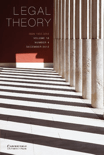
Materiali per una Storia della Cultura Giuridica
Scope & Guideline
Unveiling Legal Histories, Enriching Cultural Narratives
Introduction
Aims and Scopes
- Historical Analysis of Legal Thought:
The journal emphasizes the historical development of legal ideas, examining how historical contexts influence legal systems and culture. - Interdisciplinary Perspectives:
It integrates various disciplines such as philosophy, sociology, and political science to provide a comprehensive understanding of legal phenomena. - Social Justice and Human Rights:
A significant focus is on themes of social justice, human rights, and equality, exploring how legal frameworks shape and are shaped by societal norms. - Environmental Law and Ethics:
Recent publications indicate a growing interest in the relationship between law and environmental issues, addressing legal responses to climate change and ecological crises. - Legal Education and Pedagogy:
The journal also addresses the methodologies of teaching law and the evolution of legal education, particularly in relation to political-legal education.
Trending and Emerging
- Environmental Law and Climate Justice:
Recent papers highlight the legal implications of environmental crises, reflecting an increased urgency to address climate change through legal frameworks and policies. - Sociology of Law and Legal Realism:
There is a noticeable trend towards examining the sociology of law and legal realism, exploring how laws operate in practice and their social implications. - Gender and Disability Studies in Law:
Emerging themes around gender equality and disability rights indicate a growing focus on how legal systems address issues of marginalization and inequality. - Legal Education Reform:
The journal is increasingly addressing the methodologies and challenges of legal education, reflecting a broader discourse on how legal education can adapt to contemporary societal needs. - Intergenerational Justice:
The exploration of intergenerational justice, particularly in the context of environmental law and policy, signifies a commitment to understanding long-term impacts of legal decisions.
Declining or Waning
- Classical Legal Theories:
There seems to be a decline in the exploration of classical legal theories, with fewer papers discussing traditional jurisprudential frameworks compared to previous years. - Historical Legal Figures:
The focus on individual historical legal figures and their contributions has diminished, suggesting a shift towards broader thematic explorations rather than biographical studies. - Purely Theoretical Legal Discussions:
There is less emphasis on purely theoretical discussions of law without practical applications, as the journal increasingly favors papers that connect theory to contemporary issues.
Similar Journals

Derecho PUCP
Exploring the frontiers of legal research.Derecho PUCP is a distinguished open access journal published by the Pontificia Universidad Católica del Perú, specifically from the Faculty of Law. With a commitment to advancing legal scholarship, this journal has been an essential resource in the field of law since 2005, providing researchers, practitioners, and students with access to critical analyses and discussions on various legal topics. Based in Lima, Peru, Derecho PUCP holds a prestigious position with a Q2 ranking in the Law category, reflecting its impactful contributions to the social sciences, particularly in the legal domain. The journal publishes cutting-edge research and promotes innovative discourse, aiming to foster academic excellence and engage with contemporary legal challenges. As it continues to converge into its future issues from 2019 to 2024, Derecho PUCP exemplifies a vital platform for those committed to the pursuit of legal knowledge and research.

Legal Theory
Illuminating the Intersection of Law and PhilosophyLegal Theory, published by Cambridge University Press, stands as a significant academic journal dedicated to the exploration of the conceptual foundations and implications of law within the wider realm of philosophy. Established in 1995 and maintaining a consistent publication record through 2023, the journal has garnered a reputation for its high-quality scholarly contributions, reflected in its impressive rankings: Q2 in Law and Q1 in Philosophy as of 2023. With an impactful presence in the Scopus Ranks, Legal Theory is positioned 158th in Philosophy and 337th in Law, highlighting its relevance and influence—especially within the arts and humanities. This journal serves as a critical platform for researchers, professionals, and students who seek to engage with the intricate interplay between legal norms and philosophical inquiries. Though not open access, it offers a wealth of knowledge that is integral to advancing discourse in legal philosophy, making it an essential resource for those looking to deepen their understanding of contemporary legal theories and their implications.

e-Legal History Review
Illuminating Jurisprudence Through Historical Lense-Legal History Review, published by IUSTEL, is an esteemed journal dedicated to the exploration of legal historical scholarship. With an ISSN of 1699-5317, this publication serves as a vital resource for researchers, practitioners, and students interested in the intersection of law and history, providing a platform for rigorous academic analysis and debate. Although the journal operates under a traditional model rather than open access, it is committed to disseminating high-quality research that contributes to the understanding of legal developments across time periods and regions. With its headquarters located in Madrid, Spain, the e-Legal History Review seeks to foster international dialogue among legal historians and to promote innovative perspectives on the evolution of legal systems. Researchers looking to deepen their knowledge of jurisprudential transformations and the cultural implications of legal history will find this journal an indispensable tool for their studies.

LAW & SOCIETY REVIEW
Connecting Legal Frameworks with Societal RealitiesLAW & SOCIETY REVIEW is a prestigious academic journal published by Wiley, recognized for its significant contributions to the intertwined fields of law, sociology, and political science. With an impressive impact factor that underscores its relevance, the journal boasts a 2023 Q1 designation in both Law and Sociology, highlighting its elite status within these disciplines. Since its inception in 1977, the journal has served as a critical platform for innovative research and discourse, reflecting contemporary issues that influence legal and societal frameworks. Although it does not currently offer open access options, its robust archival resources and global reach ensure that researchers, practitioners, and students can benefit from the insights and empirical studies presented within its pages. With Scopus rankings placing it in the top percentiles of its field, LAW & SOCIETY REVIEW remains essential for those seeking to deepen their understanding of law in its social context and explore the complexities of legal systems and their societal impacts.

Revista de la Facultad de Derecho
Empowering Legal Minds through Open Access ResearchRevista de la Facultad de Derecho is an esteemed open-access journal published by the Universidad de la República, Facultad de Derecho, based in Montevideo, Uruguay. Since its inception in 2007, the journal has committed itself to disseminating high-quality legal scholarship, covering a wide range of topics within the field of law. With a dedication to promoting academic dialogue and advancing legal research, the journal serves as a vital resource for researchers, legal professionals, and students alike. The publication aims to foster discussions on contemporary legal issues while providing a platform for interdisciplinary insights. The journal is accessible online through its ISSN 0797-8316 and E-ISSN 2301-0665, ensuring that its content reaches a broad audience across the globe. With a focus on accessibility and scholarly rigor, the Revista de la Facultad de Derecho plays a pivotal role in advancing legal education and research in Latin America.

Tijdschrift voor Rechtsgeschiedenis-Revue d Histoire du Droit-The Legal History Review
Charting the Course of Legal EvolutionTijdschrift voor Rechtsgeschiedenis-Revue d'Histoire du Droit-The Legal History Review is a prestigious academic journal published by BRILL, situated in the Netherlands. With a rich publication history dating back to 1920, this journal serves as a vital resource for scholars and practitioners in the fields of legal history and historical legal studies. Although it currently holds a Q4 ranking in both the History and Law categories, making it a developing journal within its domain, it has been a significant contributor to the discourse surrounding legal traditions, historical context, and the evolution of jurisprudence. Operating within the convergence years of 1920 to 2024, the journal aims to foster scholarly dialogue and promote interdisciplinary research. While it does not offer open access, the unique insights provided within its pages are invaluable for researchers, students, and professionals seeking to enhance their understanding of legal history. By focusing on critical analyses and evidence-based research, the Legal History Review inspires a robust engagement with the past to inform contemporary legal practices and policies.

UNIVERSITY OF TORONTO LAW JOURNAL
Cultivating Excellence in Legal ThoughtUNIVERSITY OF TORONTO LAW JOURNAL, published by University of Toronto Press Inc, stands as a distinguished platform in the realm of legal scholarship, having served the academic community since its inception. With an ISSN of 0042-0220 and an E-ISSN of 1710-1174, this quarterly journal is not only recognized for its rigorous peer-review process but also boasts an impressive Q2 rank in Law and a Q3 rank in Sociology and Political Science as per the 2023 category quartiles. The journal aims to foster advanced knowledge and discourse on various legal issues, thereby appealing to researchers, professionals, and students alike who are eager to engage with contemporary legal debates. It is noteworthy that the journal currently does not offer open access, ensuring the integrity and quality of its publications for a subscribed audience. Published in Canada and available for a wide readership, the UNIVERSITY OF TORONTO LAW JOURNAL continues to be a pivotal source for critical analyses and fresh insights in the fields of law and social sciences, contributing significantly to the understanding and evolution of legal frameworks.

UNIVERSITY OF PITTSBURGH LAW REVIEW
Empowering Voices in Legal Analysis and Research.University of Pittsburgh Law Review is a prestigious academic journal that stands as a cornerstone in the field of legal scholarship. Published by the University of Pittsburgh, University Library System, this journal has been contributing to the discourse of the law since its inception, exemplifying a commitment to advancing scholarly work in various legal domains. Although its open access options are limited, the robust collection of articles and commentaries—spanning from 1973 to the present—provides an invaluable resource for researchers, professionals, and students alike. The journal currently ranks in the Q4 quartile within the field of law for 2023, indicating a specialized focus and offering significant opportunities for legal analysis and research. Positioned in a competitive landscape as Rank #784 out of 1025 in Scopus for Social Sciences - Law, it is an essential platform for emerging voices and innovative ideas that shape legal thought and policy. The University of Pittsburgh Law Review continues to foster critical examination and discussion, making it a vital resource for anyone engaged in the study or practice of law.

Annual Review of Law and Social Science
Unveiling the Interplay Between Legal Frameworks and Social DynamicsThe Annual Review of Law and Social Science, published by ANNUAL REVIEWS, is an essential interdisciplinary journal that bridges the domains of law, sociology, and political science. Established in 2006, this pivotal resource has consistently been recognized for its scholarly excellence, achieving a Q1 ranking in both the Law and Sociology and Political Science categories as of 2023. With a remarkable Scopus ranking that places it in the 93rd percentile among law journals, it serves as a vital platform for researchers and professionals seeking to engage with comprehensive reviews of contemporary issues at the intersection of these fields. Although not an open-access journal, its contributions are fundamental for advancing scholarship and fostering deeper insights into the relationship between social dynamics and legal frameworks. The journal's rigorous annual reviews provide valuable syntheses of the latest research, making it an indispensable resource for academics, policymakers, and students alike.

Veredas do Direito
Advancing legal scholarship for a just society.Veredas do Direito is a prominent academic journal dedicated to the dynamic field of law, published by the esteemed Escola Superior Dom Helder Camara in Brazil. With its ISSN 1806-3845 and E-ISSN 2179-8699, this journal has established itself as an open-access platform since 2004, fostering a culture of knowledge dissemination and accessibility. It occupies a significant niche within the legal discourse, as reflected in its 2023 Scopus rankings, placing it in the 3rd quartile for Law and the 4th quartile for Management, Monitoring, Policy, and Law. The journal's scope is comprehensive, covering a wide array of legal issues relevant in contemporary society, and it significantly contributes to academics and practitioners by offering insights into effective management and legal policy. Scholars are encouraged to engage with this publication not only for its rigorous research but also for its commitment to advancing legal scholarship in Brazil and beyond, making it an indispensable resource for those committed to excellence in legal studies.